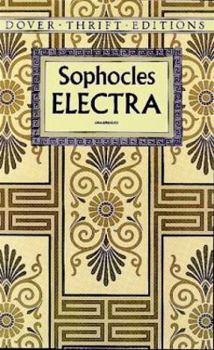Electra
Select Format
Select Condition 
Book Overview
Based on the conviction that only translators who write poetry themselves can properly recreate the celebrated and timeless tragedies of Aeschylus, Sophocles, and Euripides, the Greek Tragedy in New... This description may be from another edition of this product.
Format:Paperback
Language:English
ISBN:0486284824
ISBN13:9780486284828
Release Date:April 1995
Publisher:Dover Publications
Length:64 Pages
Weight:0.15 lbs.
Dimensions:0.2" x 5.2" x 8.3"
Age Range:14 years and up
Grade Range:Grade 9 and higher
Related Subjects
Drama History Literary Literary Criticism & Collections Literature Literature & FictionCustomer Reviews
4 ratings
Daughter of Agamemnon
Published by Thriftbooks.com User , 18 years ago
The love of her father, her murdered father, is a sort of madness. Electra notes that Niobe wept perpetually. She awaits the coming of Orestes, her banished brother, being childless, husbandless, past child-bearing age. She wonders how it could be honorable to forget. Aegisthus sits on her father's throne and occupies his bed with her mother, Clytemnestra. Clytemnestra had a problem with Agamemnon's conduct. He sacrificed her child, a daughter. It is falsely reported to the House of Atreus that Orestes is dead. Orestes comes into the scene when he deems it safe with only the chorus and Electra present. He advises Electra then that he is alive. Electra prays to Apollo to know what plans the Gods will exact for wickedness. Clytemnestra is dealt with by Orestes in the absence of Aegisthus. Aegisthus then is compelled to see her wrapped dead body as he views it under circumstances wherein he believes that he will be seeing the deceased Orestes and the end of the danger to his own life, presumably pursuant to an oracle. Orestes leads Aegisthus away, reminding him that he is not to dictate the details of his own demise.
Sophocles looks at the psychological dimensions of Electra
Published by Thriftbooks.com User , 21 years ago
The murder of Clytemnestra by her son Orestes is unique in Greek mythology in that it is the one story for which we have extant versions by all three of the great tragic poets. Consequently, it is insightful to notice how each tragedy privileges different parts of the story. In "Choephoroe" ("The Libation Bearers") by Aeschylus, the middle part of his "Orestia" trilogy, Orestes is obedient to the gods in avenging the death of his father and the pivotal scene is the confrontation between mother and son when Clytemnestra begs for her life. In "Electra" by Euripides the title character has to persuade Orestes to go through with the deed and the dramatic confrontation is now between mother and daughter. In the Sophocles version of "Electra" the emphasis is on the psychological dimensions of the situation; after all, it is from this play that Freud developed his concept of the Electra complex. Towards that end Sophocles creates a character, Chrysothemis, another sister to both Orestes and Electra. The situation is that Orestes is assumed to be dead and the issues is whether the obligation to avenge the death of Agamemnon now falls to his daughters. There is an attendant irony here in that Clytemnestra justified the murder of her husband in part because of his sacrifice of their oldest daughter Iphigenia before sailing off to the Trojan War (the curse on the House of Atreus, which involves Aegisthus on his own accord and not simply as Clytemnestra's lover, is important but clearly secondary). The creation of Chrysothemis allows for Sophocles to write a dialogue that covers both sides of the dispute. Electra argues that the daughters must assume the burden and avenge their father while Chrysothemis takes the counter position. Sophocles does come up with several significant twists on the Aeschylus version. For one thing, Sophocles reverses the order of the two murders and has Clytemnestra slain first, which sets up an interesting scene when Aegisthus gets to revel over what he believes to be the corpse of Orestes and makes the death of the usurper the final scene of the play. This becomes part of the most significant difference between the Sophocles version and the others. Whereas Orestes emerges from the skene distraught after the murder of his mother in "Cheophoroe" and is repentant in the Euripides version of "Electra," Sophocles has Orestes calmly declaring that all in the house is well. Electra is not as central a character to the drama as she is in the Euripides version, mainly because she does not have a functional purpose in this tragedy. Her main purpose is to lament over the death of the father and the supposed death of her brother. She does not provide Orestes with a sense of resolve because in this version he does not consult the oracles to learn whether or not he should kill his mother but rather how he can do the deed. Still, the part of Electra has enormous potential for performance. Ironically, this "Electra" is the least i
Sophocles was no amateur
Published by Thriftbooks.com User , 23 years ago
Great drama. I'm not a huge "classics" fan and yet I enjoyed this. If you're into Greek mythology and like flowery language and prose (and lots of melodrama) you will enjoy this. HINT: don't read these plays line-by-line like a poem - I find that it's more difficult to follow them that way. Read this like you would a novel.
A play of revenge.
Published by Thriftbooks.com User , 25 years ago
In this play, Electra, the daughter of Agamemnon and Clytemnestra, awaits the return of her brother Orestes so that he can avenge the murder of their father. I think that many scholars have tended to misread this play. It is a play about Electra, not about Orestes or Clytemnestra or Aegisthus. And, it is a tragedy. Should one allow hatred to rule their own lives to such an extent as seen in Electra, even when one is in the right? A number of scholars regard this play as inferior to Aeschylus discussion of the same events.






